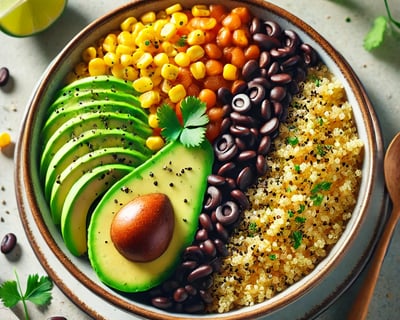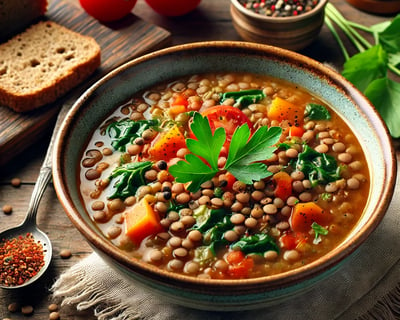Managing Gestational Diabetes with a Plant-Based Diet
6 Easy to Make Plant- Based Meals
GuideBright Wellness
5 min read
A plant-based diet can be a powerful tool for managing gestational diabetes. These diets, rich in fruits, vegetables, whole grains, legumes, nuts, and seeds, provide essential nutrients that contribute to a healthy pregnancy while helping to regulate blood sugar levels. Plant-based foods are naturally high in fiber, which slows the absorption of sugar into the bloodstream, preventing spikes in blood sugar levels. Additionally, these diets are typically lower in unhealthy fats and sugars, reducing the risk of complications for both mother and baby.
GDM is a type of diabetes that develops during pregnancy, typically disappearing after delivery. While it can be concerning, managing GDM effectively is crucial for both your health and the health of your baby. One increasingly popular approach is adopting a plant-based diet.
This blog post will explore how a plant-based diet can help you manage gestational diabetes, offering practical tips and advice to navigate this phase of your pregnancy. We'll delve into the benefits of plant-based foods, discuss meal planning strategies, and address common concerns and challenges.
Understanding Gestational Diabetes
Before we dive into the specifics of a plant-based diet, let's briefly understand what gestational diabetes is. During pregnancy, your body produces hormones that can interfere with the action of insulin, a hormone that helps your body use sugar (glucose) for energy. This can lead to higher-than-normal blood sugar levels. While many women experience mild glucose intolerance during pregnancy, GDM involves significantly elevated blood sugar levels.
Untreated GDM can lead to complications for both you and your baby. For you, it can increase the risk of developing type 2 diabetes later in life, preeclampsia (high blood pressure during pregnancy), and other pregnancy-related complications. For your baby, it can lead to macrosomia (large birth size), increased risk of jaundice, and breathing problems after birth.
The Power of Plants
A plant-based diet, rich in fruits, vegetables, whole grains, legumes, and nuts, offers several advantages in managing GDM. These foods are generally low in fat and high in fiber, which helps regulate blood sugar levels. They also provide essential vitamins, minerals, and antioxidants, supporting overall health during pregnancy.
Here's a breakdown of how specific plant-based foods can benefit you:
Fruits: Fruits are naturally sweet, but their fiber content slows down the absorption of sugar into your bloodstream, preventing sharp spikes in blood glucose. Berries, apples, and pears are excellent choices. Remember to choose fruits in moderation due to their natural sugar content.
Vegetables: Vegetables are low in calories and carbohydrates, making them ideal for managing blood sugar. Leafy greens, broccoli, cauliflower, and peppers are all great options. Aim for a variety of colorful vegetables to maximize nutrient intake.
Whole Grains: Whole grains, such as brown rice, quinoa, oats, and whole-wheat bread, are rich in fiber, which helps regulate blood sugar levels. Choose whole grains over refined grains, which can cause rapid spikes in blood sugar.
Legumes: Legumes, including lentils, beans, and chickpeas, are excellent sources of protein and fiber. They are also low on the glycemic index, meaning they don't cause a rapid rise in blood sugar.
Nuts and Seeds: Nuts and seeds are packed with healthy fats, fiber, and protein. They can help you feel full and satisfied, preventing overeating. Almonds, walnuts, chia seeds, and flaxseeds are all good choices.
Meal Planning Strategies
Transitioning to a plant-based diet during pregnancy requires careful planning. Here are some strategies to help you manage your blood sugar effectively:
Focus on Portion Control: Even healthy foods can contribute to high blood sugar if consumed in large quantities. Pay attention to portion sizes and avoid overeating.
Prioritize Protein: Include a source of protein with every meal and snack to help stabilize blood sugar levels. Plant-based protein sources include legumes, tofu, tempeh, nuts, and seeds.
Choose Complex Carbohydrates: opt for complex carbohydrates like whole grains and legumes over simple carbohydrates like white bread and sugary drinks.
Don't Skip Meals: Skipping meals can lead to low blood sugar, which can be dangerous during pregnancy. Eat regular, balanced meals and snacks throughout the day.
Hydration is Key: Drink plenty of water throughout the day to help regulate blood sugar and overall health.
Consult a Registered Dietitian: Working with a registered dietitian specializing in gestational diabetes can provide personalized guidance and support. They can help you create a meal plan that meets your specific needs and preferences.
Addressing Common Concerns
Transitioning to a plant-based diet can raise some concerns. Here are some common questions and answers:
Will I get enough protein? Absolutely! Plant-based diets can provide ample protein if you include a variety of protein sources in your meals.
Will I get enough iron? Iron is crucial during pregnancy. Plant-based sources of iron include lentils, spinach, and tofu. Pairing these foods with vitamin C-rich foods can enhance iron absorption.
Will I get enough calcium? Calcium is essential for bone health. Plant-based sources of calcium include leafy greens, fortified plant milks, and tofu.
What about vitamin B12? Vitamin B12 is primarily found in animal products. Supplementation may be necessary for pregnant women following a plant-based diet. Consult your doctor or a registered dietitian for guidance.
Recipes and Resources
Numerous resources are available to help you plan delicious and nutritious plant-based meals. Online recipe websites, cookbooks, and registered dietitians can provide valuable support. Remember to focus on whole, unprocessed foods and avoid highly processed plant-based alternatives that may be high in sodium or unhealthy fats.
For those considering a plant-based diet during pregnancy, here are six easy-to-make, tasty meal options:
1. Veggie Stir-Fry: A colorful mix of bell peppers, broccoli, snap peas, and tofu stir-fried in a ginger-garlic sauce served over brown rice.
2. Chickpea Salad: A refreshing salad with chickpeas, cucumbers, tomatoes, red onions, and a lemon-tahini dressing.
3. Lentil Soup: A hearty soup made with lentils, carrots, celery, tomatoes, and spinach, seasoned with herbs and spices.
4. Quinoa and Black Bean Bowl: Quinoa is topped with black beans, corn, avocado, and a squeeze of lime, garnished with fresh cilantro.
5. Stuffed Bell Peppers: Bell peppers stuffed with a mixture of quinoa, black beans, diced vegetables, and spices, baked until tender.
6. Oatmeal with Berries: A comforting bowl of oatmeal topped with fresh berries, chia seeds, and a drizzle of almond butter.
These meals are not only nutritious but also help keep blood sugar levels in check, making them ideal for managing gestational diabetes. By embracing a well-planned plant-based diet, pregnant women can enjoy delicious meals while supporting their health and their baby's development.
In conclusion, managing gestational diabetes with a plant-based diet is achievable with careful planning and support. By focusing on whole unprocessed plant-based foods, practicing portion control, and seeking professional guidance, you can effectively manage your blood sugar levels and ensure a healthy pregnancy for both you and your baby. Remember to consult your doctor or a registered dietitian for personalized advice and support throughout your pregnancy. This is a journey, and with the right approach, you can navigate it successfully and enjoy a healthy and happy pregnancy.




GuideBright, LLC
Empowering individuals to embrace healthier lifestyles in the pursuit of creating brighter, more fulfilling lives.
For Inquiries Email Us:
Receive updates during your glow and healthy wellness journey!
© 2025. All rights reserved.
